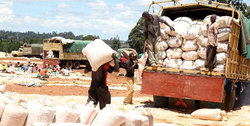African Agriculture | August 08, 2011
How would an investor export maize or rice from a famine-hit country?
by Chido Makunike
The controversies over foreign investment in African land continue to rage. From the many issues heatedly raised will hopefully emerge models of investment that achieve the aims of the various parties without being seen as exploitative. It is and will continue to be a huge challenge for all concerned, but foreign investment in African agriculture is neither new nor will the factors driving both investors and host countries to consider it diminish in the near term.
The first modern Africa land rush was when European countries carved up the continent into the economic spheres of influence that correspond to Africa's borders today. A key part of the colonization process that followed involved the introduction of 'cash crops' like coffee, cotton, groundnuts and many others on huge estates to supply the raw materials for the colonial metropole's industrial processes. Sometimes long after some of these crops have ceased to be economically viable, many African countries' economies still heavily depend on them, creating all sorts of problems that have so far defied easy solution.
Together with the introduction of new crops and farming techniques, that first wave of land 'investment' also involved conquest, large-scale dispossession and relocation, forced labor and many of the other lingering effects that today cause many Africans to be instinctively suspicious of modern-day investors. In theory the self-governing status of today's African countries should protect against the abuses of the colonial era but this is far from straight-forward and certain to skeptics.
So finding a model that works to maximize the hoped-for benefits for investors and locals while minimizing the many issues of concern is clearly an on-going process.
The drought and famine in East Africa is already throwing up some uncomfortable questions for the model of large scale agro-investment in a poor country for export.
How would an agribusiness be able to export maize from a famine-stricken country that depends on the crop as its staple food? The furore over South Korean company Daewoo's plans to grow export maize in Madagascar was at least in a mainly rice-eating country. But imagine an investor had spent years and millions of dollars developing export-maize plantations in a mainly maize-eating east African country amidst the region's current famine.
How would it look for the investor to cite 'but that's what we agreed' as a reason to export the maize in the face of mass local maize starvation? More to the point, regardless of the investment agreement signed, would the government dare to allow such exports in a time of famine?
Easy, some might say, the investor should take this into account by incorporating a special 'famine' escape clause into his contract with his export markets, explaining that in the event of a local shortage he would not be able to supply, and would have to sell the maize locally.
But is this as clear cut as that may sound? Because of of the fraught, political importance of maize in Africa, it is not really a fully freely-tradeable crop, especially in times of scarcity. In the midst of a maize famine in which the government has prohibited exports but also does not have money to pay for your maize, what happens? In a 'free market' situation you should be able to keep the maize in your warehouse until you have negotiated a satisfactory payment arrangement, but how realistic is that in a time of famine?
What about if the government issues an emergency decree setting the maize purchase price below the investor's cost of production? This is far from a mere rhetorical question: in many countries this has often been a reality. The government needs to keep maize prices high enough to encourage farmers, but also low enough to keep this highly political crop at prices 'affordable' to the voters. Government price subsidies are sometimes part of the mix of answers but they are expensive and hard to sustain. Price ceilings whose considerations are as much political as economic/agricultural are sometimes another part of the answer, especially in difficult times.
If the government commandeers all the country's production of the staple crop by requiring all of a season's maize production to be sold to the government-owned maize marketing monopoly (not unheard of), promising to pay when it can, how does the investor pay his debts in the meantime? This is a problem that has plagued African commercial maize farmers in almost every country at one time or another.
Of course the investor may hope he is given special dispensation in the event of any of these matters arising, which could be the case, but in a famine all bets are off.
So the investor looks at all this and says, ''Okay, I will avoid growing locally 'political' crops for export in case these issues come up. I will grow something more safe, lucrative and non-political, like flowers.''
The investor buys or leases huge parcels of land to grow flowers for export. All seems to go very well for some time. Everyone is pleased at the new jobs, revenue, etc. When drought hits, the investor's hands are 'clean' because he doesn't have to get involved in the inevitably messy supply/price politics of staple crops during times of shortage.
But then the drought persists and there are growing concerns that your export flowers are using up too much of the water that should go for other more pressing concerns. You immediately point to the appropriate clause in your investment contract promising you X millions of liters of water for Y number of years. But if a government is forced to choose between honoring the promises it made to an investor in a 'normal' time and the needs/demands of hungry, angry hordes during a time of famine, well...
Africa needs all kinds of investment in its agriculture; that much everybody seems to agree on. The potential negatives of the current waves of large-scale investments have mainly been examined from the perspectives of how the host countries have not done enough to ensure a fair deal for themselves. But as the few examples presented here try to show, there are also investors who will get burned not because the idea of investing itself was wrong, but because they were naive, over-eager and failed to do sufficient due diligence before deciding how, where and in what specific sectors to invest in.
All you investors who are sure you 'know Africa,' if and when your carefully laid business plan goes belly up during a famine, don't say you weren't warned at the beginning about the many not so-obvious factors to ponder.
Related reading:
Africa increasingly questions the sustainability of dependence on maize for food security
How would an investor export maize or rice from a famine-hit country?
by Chido Makunike
The controversies over foreign investment in African land continue to rage. From the many issues heatedly raised will hopefully emerge models of investment that achieve the aims of the various parties without being seen as exploitative. It is and will continue to be a huge challenge for all concerned, but foreign investment in African agriculture is neither new nor will the factors driving both investors and host countries to consider it diminish in the near term.
The first modern Africa land rush was when European countries carved up the continent into the economic spheres of influence that correspond to Africa's borders today. A key part of the colonization process that followed involved the introduction of 'cash crops' like coffee, cotton, groundnuts and many others on huge estates to supply the raw materials for the colonial metropole's industrial processes. Sometimes long after some of these crops have ceased to be economically viable, many African countries' economies still heavily depend on them, creating all sorts of problems that have so far defied easy solution.
Together with the introduction of new crops and farming techniques, that first wave of land 'investment' also involved conquest, large-scale dispossession and relocation, forced labor and many of the other lingering effects that today cause many Africans to be instinctively suspicious of modern-day investors. In theory the self-governing status of today's African countries should protect against the abuses of the colonial era but this is far from straight-forward and certain to skeptics.
So finding a model that works to maximize the hoped-for benefits for investors and locals while minimizing the many issues of concern is clearly an on-going process.
The drought and famine in East Africa is already throwing up some uncomfortable questions for the model of large scale agro-investment in a poor country for export.
How would an agribusiness be able to export maize from a famine-stricken country that depends on the crop as its staple food? The furore over South Korean company Daewoo's plans to grow export maize in Madagascar was at least in a mainly rice-eating country. But imagine an investor had spent years and millions of dollars developing export-maize plantations in a mainly maize-eating east African country amidst the region's current famine.
How would it look for the investor to cite 'but that's what we agreed' as a reason to export the maize in the face of mass local maize starvation? More to the point, regardless of the investment agreement signed, would the government dare to allow such exports in a time of famine?
Easy, some might say, the investor should take this into account by incorporating a special 'famine' escape clause into his contract with his export markets, explaining that in the event of a local shortage he would not be able to supply, and would have to sell the maize locally.
But is this as clear cut as that may sound? Because of of the fraught, political importance of maize in Africa, it is not really a fully freely-tradeable crop, especially in times of scarcity. In the midst of a maize famine in which the government has prohibited exports but also does not have money to pay for your maize, what happens? In a 'free market' situation you should be able to keep the maize in your warehouse until you have negotiated a satisfactory payment arrangement, but how realistic is that in a time of famine?
What about if the government issues an emergency decree setting the maize purchase price below the investor's cost of production? This is far from a mere rhetorical question: in many countries this has often been a reality. The government needs to keep maize prices high enough to encourage farmers, but also low enough to keep this highly political crop at prices 'affordable' to the voters. Government price subsidies are sometimes part of the mix of answers but they are expensive and hard to sustain. Price ceilings whose considerations are as much political as economic/agricultural are sometimes another part of the answer, especially in difficult times.
If the government commandeers all the country's production of the staple crop by requiring all of a season's maize production to be sold to the government-owned maize marketing monopoly (not unheard of), promising to pay when it can, how does the investor pay his debts in the meantime? This is a problem that has plagued African commercial maize farmers in almost every country at one time or another.
Of course the investor may hope he is given special dispensation in the event of any of these matters arising, which could be the case, but in a famine all bets are off.
So the investor looks at all this and says, ''Okay, I will avoid growing locally 'political' crops for export in case these issues come up. I will grow something more safe, lucrative and non-political, like flowers.''
The investor buys or leases huge parcels of land to grow flowers for export. All seems to go very well for some time. Everyone is pleased at the new jobs, revenue, etc. When drought hits, the investor's hands are 'clean' because he doesn't have to get involved in the inevitably messy supply/price politics of staple crops during times of shortage.
But then the drought persists and there are growing concerns that your export flowers are using up too much of the water that should go for other more pressing concerns. You immediately point to the appropriate clause in your investment contract promising you X millions of liters of water for Y number of years. But if a government is forced to choose between honoring the promises it made to an investor in a 'normal' time and the needs/demands of hungry, angry hordes during a time of famine, well...
Africa needs all kinds of investment in its agriculture; that much everybody seems to agree on. The potential negatives of the current waves of large-scale investments have mainly been examined from the perspectives of how the host countries have not done enough to ensure a fair deal for themselves. But as the few examples presented here try to show, there are also investors who will get burned not because the idea of investing itself was wrong, but because they were naive, over-eager and failed to do sufficient due diligence before deciding how, where and in what specific sectors to invest in.
All you investors who are sure you 'know Africa,' if and when your carefully laid business plan goes belly up during a famine, don't say you weren't warned at the beginning about the many not so-obvious factors to ponder.
Related reading:
Africa increasingly questions the sustainability of dependence on maize for food security















